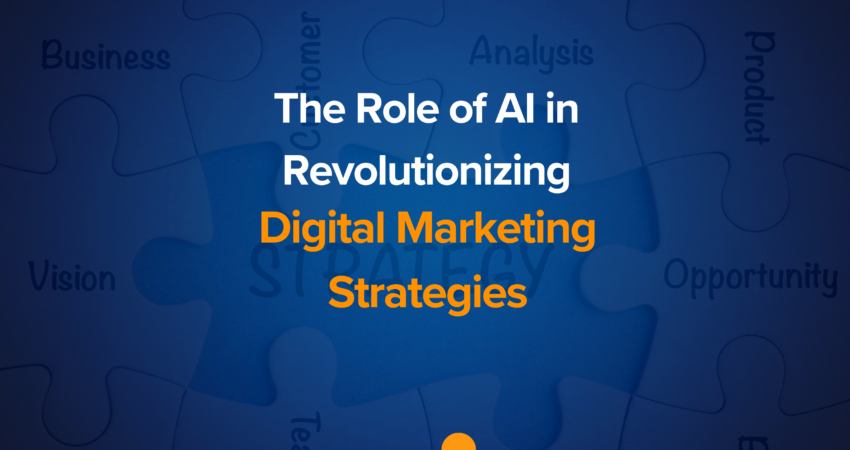
guptavikash7994@gmail.com
- November 9, 2024
- Information technology
Artificial Intelligence (AI) is transforming industries across the globe, and digital marketing is no exception. As we move further into 2025, AI continues to be a pivotal force in reshaping marketing strategies, allowing businesses to connect with audiences in smarter, more personalized ways. The integration of AI in digital marketing empowers brands to automate processes, leverage data-driven insights, and deliver meaningful customer experiences, ultimately driving business growth.
Let’s explore how AI is revolutionizing digital marketing strategies and why it’s a game-changer for businesses seeking to thrive in today’s digital-first world.
Enhanced Personalization and Customer Segmentation
One of the most significant advantages of AI in digital marketing is its ability to deliver highly personalized experiences. With AI, businesses can analyze vast amounts of data to understand individual customer preferences, behaviors, and interactions. This level of insight enables marketers to segment audiences more precisely, tailoring content, offers, and recommendations to resonate with specific customer needs.
Personalization is no longer limited to addressing users by name—it involves delivering relevant content at the right time through the right channels. AI-driven personalization boosts engagement, loyalty, and conversions by creating a more tailored customer journey.
Automated Marketing Processes for Increased Efficiency
Automation has become essential in digital marketing, and AI takes it to a new level. In 2025, AI-powered marketing automation streamlines repetitive tasks, from sending emails and managing social media posts to scheduling content and running ad campaigns. This not only saves time but also enables marketers to focus on high-value activities that require creativity and strategy.
Marketing automation tools powered by AI ensure that messages reach the target audience when they are most likely to engage, driving better results. AI algorithms continuously learn from interactions, optimizing campaigns in real-time and maximizing the return on investment (ROI).
Predictive Analytics for Smarter Decision-Making
Predictive analytics, powered by machine learning, enables marketers to make data-driven decisions based on historical and current data trends. By analyzing consumer data and past behaviors, AI can predict future trends, preferences, and purchasing decisions with impressive accuracy.
For example, AI can forecast which products a user is likely to purchase next or which content topics will resonate with a target audience. Predictive analytics helps marketers anticipate customer needs, create more relevant campaigns, and strategically allocate resources, giving them a competitive advantage in a fast-evolving market.
AI-Driven Content Creation and Optimization
AI is revolutionizing content marketing by making it easier to create and optimize content. Advanced AI tools can assist with writing articles, generating captions, and even creating video scripts. While human input is still essential for adding personality and emotion, AI-powered tools enable marketers to generate content faster and more efficiently.
Additionally, AI aids in optimizing content for search engines and user intent. By analyzing keyword trends, AI tools can suggest the best keywords, structure, and topics to enhance search engine optimization (SEO) performance. In 2025, content marketing becomes increasingly data-driven, with AI helping marketers craft content that aligns with both search algorithms and user needs.
Chatbots and Improved Customer Support
AI-powered chatbots have evolved from basic, rule-based systems to sophisticated conversational agents capable of understanding natural language. These chatbots provide instant customer support, answering common questions and guiding users through their journey on a website or app. In 2025, AI chatbots are more intuitive and personalized, able to offer recommendations based on user history and preferences.
Implementing AI-driven chatbots enhances user experience, reduces response time, and frees up human agents to handle complex inquiries. For businesses, this means improved customer satisfaction and retention rates, as well as cost savings in customer service operations.
Optimizing Ad Campaigns with Machine Learning
AI’s role in digital advertising is revolutionizing how brands reach their audiences. Machine learning algorithms analyze user data to optimize ad placements, targeting, and budgets. AI-driven advertising platforms continuously learn from ad performance data, adjusting campaigns to maximize effectiveness without human intervention.
For instance, AI can determine the best times to display ads, identify high-performing ad creatives, and target users who are more likely to convert. This level of optimization not only increases ROI but also ensures that marketing budgets are used efficiently.
Social Media Sentiment Analysis for Brand Insights
Social media platforms are goldmines of customer insights, and AI-powered sentiment analysis tools allow marketers to tap into this resource. By analyzing social media posts, comments, and interactions, AI can gauge public opinion, identify trending topics, and assess brand sentiment.
In 2025, businesses leverage AI-driven sentiment analysis to understand how customers perceive their brand in real time. These insights help marketers craft more effective social media strategies, manage their brand reputation, and respond proactively to both positive and negative feedback.
Voice Search Optimization
With the rise of smart speakers and voice-activated assistants, voice search optimization has become essential. AI-powered voice search capabilities allow users to search using natural language, which differs from traditional text-based queries. In 2025, businesses need to optimize their digital content to capture voice search traffic by focusing on conversational keywords, local SEO, and question-based content.
Voice search optimization helps brands reach audiences who prefer hands-free browsing, enhancing accessibility and positioning them to capture a growing market segment.
Conclusion: Embracing AI for a Competitive Edge in Digital Marketing
AI has become an invaluable asset for digital marketers, enabling smarter, data-driven strategies that yield higher returns. By embracing AI, businesses can create personalized experiences, automate processes, predict trends, and optimize content—all while maximizing efficiency. As AI technology advances, its role in digital marketing will only grow, shaping how brands connect with their audiences in the years to come.
For businesses in Mumbai and beyond, integrating AI into digital marketing strategies in 2025 is no longer optional; it’s essential for staying competitive. By leveraging AI’s capabilities, companies can achieve higher customer engagement, improved ROI, and a strong market position in an increasingly digital world.













